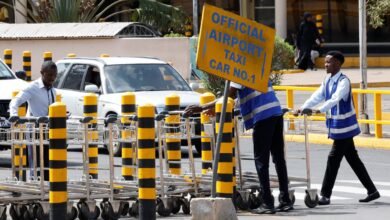
Stanbic Holdings Plc said Kenya’s credit rating downgrade and uncertainty caused by weeks of protests made for a tough banking environment, while voicing confidence on its ability to maintain a lid on bad debt even in such conditions.
“Some of the economic activity has been dampened in particular industries, floods, civil unrest and also the downgrade on the sovereign,” said Patrick Mweheire, regional chief executive officer for the Standard Bank Group Ltd. unit.
At least 61 people have died in anti-government protests since they erupted in mid-June in the East African nation, which is battling to raise revenue to service a debt burden that’s forced it to enlist International Monetary Fund support. Fitch Ratings earlier this month downgraded the country’s credit score further into junk territory because of budget risks.
Mweheire, speaking in an interview Thursday alongside Chief Finance Officer Dennis Musau, was confident in the bank’s ability to handle the conditions.
Also Read: Stanbic Holdings Dividends up 21.8% After Record Net Profit in 2023
It has cut first-half impairments by 22% to 1.96 billion shillings ($15 million) year-on-year, posting a gross non-performing loans ratio of 9.4% compared to the industry’s 16%, Musau said.
“Our 2026 target is to get our NPL ratio below 9.4%,” Musau said. “We are well aware of macro challenges that our customers are facing. So there’s strain.”
It has provided for close to 70% of its loan-book, he said.
The lender with operations in Kenya and South Sudan is cautiously optimistic on delivering on its target to achieve mid-20% returns on equity in the near term from 21% currently, Mweheire said.
Further improvement is expected on the bank’s non-performing loans for the full-year, with recovery of legacy credit and continuing caution by the bank, Nairobi-based Sterling Research said in a note.
“The group’s NPL ratio is commendable considering the banking sector’s average and this points to prudent lending practices, monitoring and collection efforts,” it said.






What’s up it’s me, I am also visiting this web page daily, this web site is really fastidious and
the vkewers aree actually sharing fastidioius thoughts. https://u7bm8.mssg.me/
Your means of telling everything in this piece of writing is really fastidious,all bbe capable of effortlessly know
it, Thanks a lot. https://chaakri.com/employer/22bit-22bit-casino14/
Your means of telkling everything in this piece oof writing is really fastidious, all be capable of effortlessly know it, Thanks a lot. https://chaakri.com/employer/22bit-22bit-casino14/